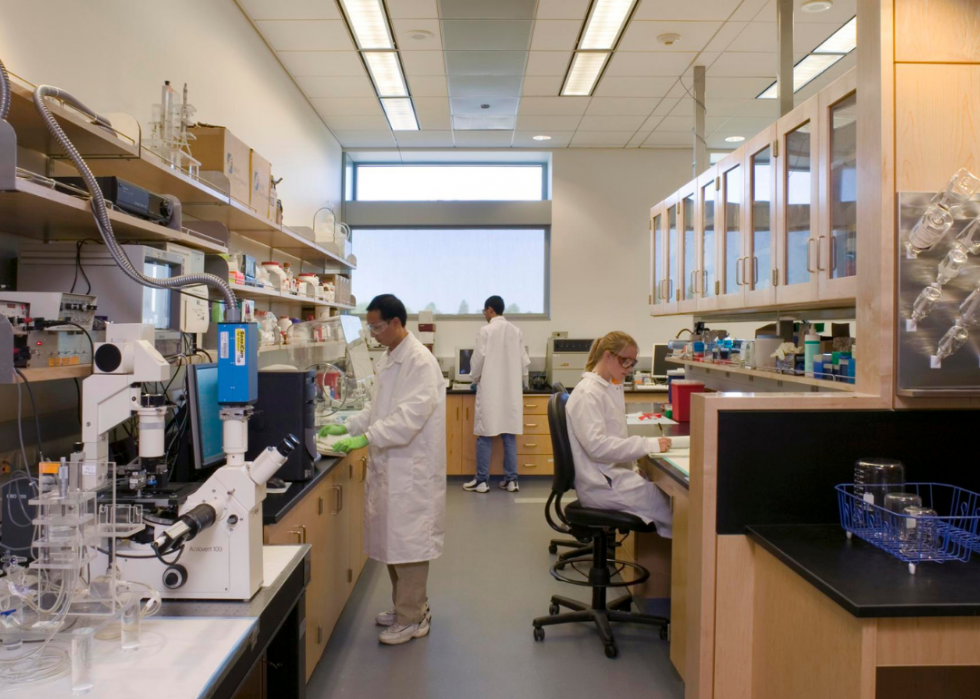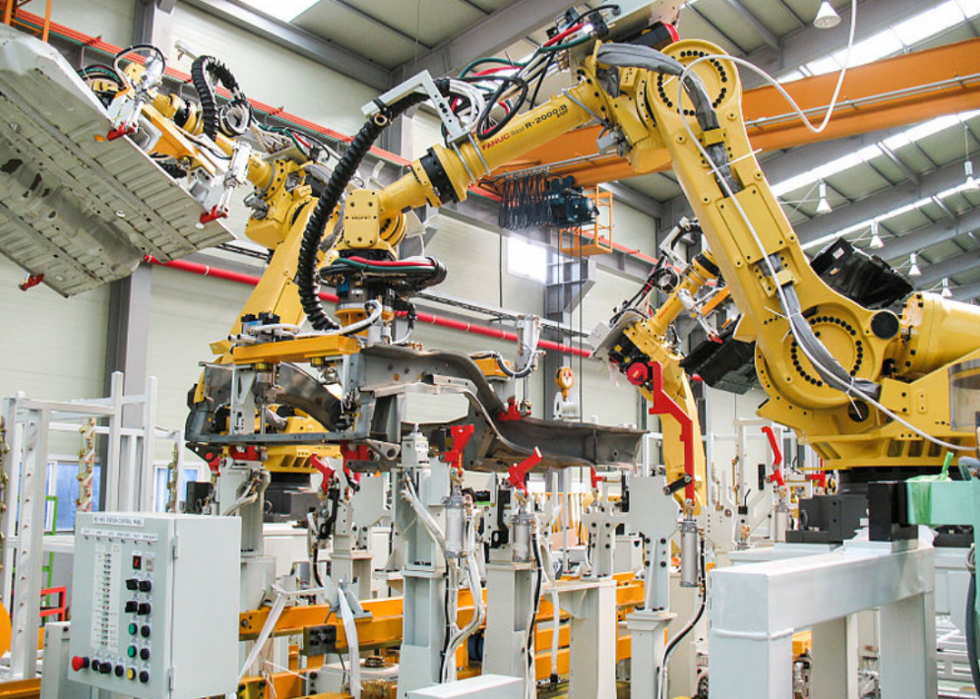Nearly one-third of all college students will change their major at least once within three years, according to an estimate by the National Center for Education Statistics. Choosing a field of study is overwhelming as it is, and program difficulty often makes the difference between pursuing or dropping a given major. According to the cited study, over half of all math majors switch concentrations, as do 35% of all STEM majors.
Because there is currently a shortage of STEM-trained workers in the US, this path offers many of the highest-paying jobs. According to the Brookings Institute, it takes twice as long for employers to fill a STEM position than other fields. This lack of STEM professionals makes demand.
Stacker examined a variety of degree programs to determine the top 50 majors leading to the best-paying jobs. For this comparison, data came from PayScale’s 2021-2022 College Salary Report. Rankings are based on the mid-career median salary reported for the major or the salary expected after 10 years of continuous employment in the major’s field.
This calculation does not consider equity or stock compensation, retirement plans, and non-cash benefits—such as health care. In the case of a tie, preference was given based on the starting salary expected for a worker in the field within their first five years of employment. This statistic is provided along with the major’s median wages. Payscale’s College Salary Report is a compensation survey based on the responses of 3.2 million college graduates. Check out the survey’s full methodology here.
#50 Computer Science
- Early career pay: $75,100
- Mid-career pay: $123,400
- Percent of alumni who say their work makes the world a better place: 42%
Computer science is a rapidly expanding field of study, projected to grow 15% in the next ten years according to the Bureau of Labor Statistics. the study of computation, automation, and information. Careers in this field include software and web development, AI engineering, and IT project management.
#48 Managerial Economics
- Early career pay: $65,200
- Mid-career pay: $123,600
- Percent of alumni who say their work makes the world a better place: 41%
The study of managerial economics involves the study of production, distribution, and profit optimization. Careers in this field include banking, international management consulting, accounting, and policymaking in a variety of fields. Collegefactual reports a 7% increase in demand within this field between 2016-2026.
#48 Biomedical Engineering (BME)
- Early career pay: $71,300
- Mid-career pay: $123,600
- Percent of alumni who say their work makes the world a better place: 72%
Similar to physics, biomedical engineering is a multifaceted field. Specialties include bioinstrumentation, biomaterials, biomechanics, clinical engineering, rehabilitation engineering, and system physiology. Beyond engineering positions, jobs in this field include teaching, research, orthopedic construction, medical imaging, and medical equipment technician.
#47 Economics and Mathematics
- Early career pay: $68,200
- Mid-career pay: $124,100
- Percent of alumni who say their work makes the world a better place: 35%
An economics and mathematics degree can open the doors to careers as a financial analyst, economist, or actuary. This field is projected to grow 31% between the years 2021-2031. Earning a degree in economics and mathematics involves the study of statistics, economics, and mathematical analysis of world events using econometric methods.
#46 Industrial & Systems Engineering
- Early career pay: $73,100
- Mid-career pay: $124,800
- Percent of alumni who say their work makes the world a better place: 48%
Industrial and systems engineers seek to implement and integrate materials, energy, people, information, and equipment. This discipline focuses on the productivity and quality improvement of industrial systems. As an Industrial & Systems Engineering graduate, you could pursue a career in fields like project management, STEM, CEOs of major tech companies, car design, or even movie production.
#45 Computer Science (CS) & Mathematics
- Early career pay: $70,500
- Mid-career pay: $125,100
- Percent of alumni who say their work makes the world a better place: 43%
Computer scientists and mathematicians are in high demand, with the career outlook projected to increase 21% between 2021-2031. Pursuing this degree, studies include theoretical computer science, artificial intelligence, and computational mathematics.
#42 Quantitative Business Analysis
- Early career pay: $74,000
- Mid-career pay: $125,400
- Percent of alumni who say their work makes the world a better place: 37%
Quantitative business analysts use mathematical techniques to evaluate financial markets. As a graduate with a degree in this field, career options include quantitative or business analyst. According to the Bureau of Labor Statistics, this field is expected to grow 23% in the next ten years.
#42 Optical Science & Engineering
- Early career pay: $71,000
- Mid-career pay: $125,400
- Percent of alumni who say their work makes the world a better place: NA
Optical science and engineering is the study of light and its interactions with matter. For graduates with degrees in optical science and engineering, the job growth estimate is 4%. Career options for this field include optical engineering, network manufacturing, engineering technology, instrumentation engineering
#42 Astronomy
- Early career pay: $66,600
- Mid-career pay: $125,400
- Percent of alumni who say their work makes the world a better place: 47%
A degree in astronomy involves studying the patterns and formations of black holes, galaxies, and stars. The field of astronomy includes careers in the fields of aerospace engineering, science journalism, teaching, and even meteorology. Job outlook in this field is projected to grow 8% from 2021-2031, according to the Bureau of Labor Statistics.
#41 Aerospace Engineering
- Early career pay: $74,300
- Mid-career pay: $125,700
- Percent of alumni who say their work makes the world a better place: 55%
Aerospace engineering is the design, testing, development, and construction of air and spacecraft, as well as the necessary equipment used in air and space travel. Careers in this field can take you to private aerospace companies, multidisciplinary labs, universities, and government institutions such as NASA or certain branches of the US military. The demand in this field is projected to rise by 6%.
#40 Electrical & Electronics Engineering (EEE)
- Early career pay: $74,700
- Mid-career pay: $125,800
- Percent of alumni who say their work makes the world a better place: 56%
Within the next ten years, electrical engineering is projected to increase in demand by 3%, according to a recent report from the Bureau of Labor Statistics. Electrical engineering degree holders can work in private companies, federal government positions, research labs, and universities. The field involves telecommunications, manufacturing, development engineering, and more.
#39 Computational & Applied Mathematics
- Early career pay: $75,500
- Mid-career pay: $126,000
- Percent of alumni who say their work makes the world a better place: 45%
A study of computational and applied mathematics involves modeling, analysis, and algorithm development. These programs enable students to apply mathematics in a career-focused context, preparing them for careers as analysts, civil engineers, hydrologists, surveyors, and more. In the field of mathematics, the Bureau of Labor Statistics reports a 31% increase in demand from 2021-2031.
#38 Instrumentation & Control Engineering
- Early career pay: $73,100
- Mid-career pay: $126,400
- Percent of alumni who say their work makes the world a better place: NA
Earning a degree in instrumentation and control engineering prepares for careers in engineering, processing management, and instrumentation and control. A job in this field involves the study of process variables such as temperature, humidity, pH, speed, and force.
#37 Welding Engineering
- Early career pay: $81,000
- Mid-career pay: $126,600
- Percent of alumni who say their work makes the world a better place: 56%
As a welding engineering major, you will study the application of mechanical, structural, and technical engineering principles to the construction process. Welding engineers have an added background of math and science that qualifies them to advise welders. The welding field is projected to grow 2%.
#36 Mechanical & Aeronautical Engineering
- Early career pay: $70,900
- Mid-career pay: $126,900
- Percent of alumni who say their work makes the world a better place: 60%
Mechanical and aeronatical engineering majors study the combined fields of mechanical engineering and aircraft systems. In the field of aerospace engineering, job growth is projected to grow 6% between 2022-2031. Career opportunites in NASA, several branches of the federal government, and private and public corporations are available to graduates in this field.
#35 Marine Transportation Management
- Early career pay: $71,100
- Mid-career pay: $127,500
- Percent of alumni who say their work makes the world a better place: NA
Marine transportation management is the study of marine transportation systems and vessel operation. The career outlook for this field is 1%, according to the Bureau of Labor Statistics.
#33 Foreign Affairs
- Early career pay: $54,800
- Mid-career pay: $127,700
- Percent of alumni who say their work makes the world a better place: 36%
In the field of foreign affairs, graduates can find careers working as research specialists, foreign disclosure advisors, or policy specialists. The job outlook in this field is 6% for the years 2021-2031. A foreign affairs program includes the study of international relationships, politics, and government structures.
#33 Electrical Engineering (EE)
- Early career pay: $75,600
- Mid-career pay: $127,700
- Percent of alumni who say their work makes the world a better place: 54%
Electrical engineering is the study of electrical systems, their designs, equipment, and assembly. According to the Bureau of Labor Statistics, the field will experience a 3% growth between 2021-2031. Careers within this field include engineering research and development, telecommunications, and various government positions.
#32 Nuclear Engineering
- Early career pay: $76,400
- Mid-career pay: $129,400
- Percent of alumni who say their work makes the world a better place: 62%
A career in nuclear engineering involves research and development of systems that regulate and control nuclear energy. Graduates with this degree pursue careers as nuclear power plant managers, operators, designers, developers, and researchers. The demand for nuclear engineers is expected to decline by 11% between 2021-2031.
#31 Mechatronics
- Early career pay: $72,800
- Mid-career pay: $129,600
- Percent of alumni who say their work makes the world a better place: 48%
In the field of mechatronics technology, students learn to design, construct, operate, and repair a wide range of robotic and unmanned machines. This can be anything from automated factory equipment to a submarine drone surveying an oil rig, but most mechatronic technicians work in some form of manufacturing. The industry is expected to shrink 4% before 2031.
#30 Corporate Accounting & Finance
- Early career pay: $65,200
- Mid-career pay: $129,700
- Percent of alumni who say their work makes the world a better place: 55%
With a Corporate Accounting & Finance major, one will learn to analyze, report on, and direct company finances and investments to optimize growth. Relevant careers are expected to see a sharp 17% growth in coming years. Nearly a third of accountants work in finance and insurance, but a sizable portion end up in government or management positions.
#29 Entrepreneurship & Marketing
- Early career pay: $51,400
- Mid-career pay: $129,800
- Percent of alumni who say their work makes the world a better place: 45%
As students pursue careers in Entrepreneurship & Marketing, they will gain proficiency in advertisement, promotion, budgeting, and productive cooperation with customers. Many become self-employed, but most go into advertising and public relations. The field is expected to see a 10% growth in the coming decade.
#28 Naval Architecture & Marine Engineering
- Early career pay: $74,400
- Mid-career pay: $130,700
- Percent of alumni who say their work makes the world a better place: 49%
Aspiring naval architects should expect to learn how to design, construct, and maintain industrial and military ships and submarines. This can be anything from sailboats to aircraft carriers and nuclear submarines. Before 2031, the industry will have grown 4%, the expected national average from most industries.
#27 Computer Engineering (CE)
- Early career pay: $79,000
- Mid-career pay: $131,000
- Percent of alumni who say their work makes the world a better place: 46%
An education in CE will provide students with the skills they need to research, test, and develop hardware and computer systems. As computers are integrated into every modern industry, there is no shortage of fields wherein computer engineers can find work. The BLS predicts that demand to fill these positions may see a 5% rise in coming years.
#26 Aeronautical Engineering
- Early career pay: $74,700
- Mid-career pay: $131,000
- Percent of alumni who say their work makes the world a better place: 66%
As students explore aerospace engineering, they develop the skills they will need to research and design air and spacecraft such as airplanes, satellites, and missiles. The field should see a 6% growth from 2021 to 2031. While most aeronautical engineers go into the private sector, a good portion join federal and/or military positions.
#24 Marine Engineering
- Early career pay: $79,900
- Mid-career pay: $131,300
- Percent of alumni who say their work makes the world a better place: 60%
Future marine engineers will develop the skills to develop, build, and repair federally and privately-owned ships and submarines. That includes oil tankers, submarines, aircraft carriers, sailboats, etc. The industry should see a 4% increase within the decade.
#24 Computer Science (CS) & Engineering
- Early career pay: $79,400
- Mid-career pay: $131,300
- Percent of alumni who say their work makes the world a better place: 44%
Students interested in Computer Sciences can expect to gain the skills needed to research and repurpose new or existing technology and implement it into new niches. A third of Computer Scientists find work in the federal government. Careers in this field are expected to spike 21% between 2021 and 2031.
#23 Electrical & Computer Engineering (ECE)
- Early career pay: $78,100
- Mid-career pay: $131,600
- Percent of alumni who say their work makes the world a better place: 49%
Beyond an education in computer hardware, electrical engineers will delve into motor mechanics, navigation, radar, communications technology, and more. Most ECE majors find work in power grid maintenance or telecommunications. Demand for electrical engineers is expected to grow by 3% in the coming decade, slightly slower than the projected national average of industry growth.
#22 Computer Systems Engineering
- Early career pay: $79,000
- Mid-career pay: $133,200
- Percent of alumni who say their work makes the world a better place: 51%
Computer Systems students learn how to develop, test, analyze, and maximize software and programs for optimal user convenience. System designers and engineers can find work in most fields, as computers and software have been adopted into every industry. These opportunities are expected to increase by 25% in the coming years.
#21 Political Economy
- Early career pay: $65,100
- Mid-career pay: $133,500
- Percent of alumni who say their work makes the world a better place: 29%
In political science courses, students will develop the skill sets needed to analyze, track, and optimize political systems and economies. The field is expected to see a 6% increase before 2031. Nearly six in ten Political Economy majors find work in the federal sector. Many of the other ten become educators in the topic.
#20 Actuarial Science
- Early career pay: $67,700
- Mid-career pay: $134,400
- Percent of alumni who say their work makes the world a better place: 43%
In this course, prospective Actuaries will develop skills in mathematics, finance, statistics, and risk analysis that they need to analyze, predict, and optimize company profits. Actuaries are some of the most crucial players in the insurance industry. Three-quarters of Actuarial Science majors enter that field, and occupations relevant to the study are predicted to grow 21% in the next eight years.
#19 Cognitive Science
- Early career pay: $68,700
- Mid-career pay: $135,200
- Percent of alumni who say their work makes the world a better place: 42%
Cognitive Science students explore the human mind, delving into psychology and behavioral science as well as mental, social, and cognitive health. They will focus their studies on aiding and improving the lives of those with mental health struggles. The field expects to see a 6% growth in coming years. Most move on to become clinical and counseling psychologists, and nearly a third move into schools as counselors.
# 17 Chemical Engineering
- Early career pay: $76,900
- Mid-career pay: $135,900
- Percent of alumni who say their work makes the world a better place: 55%
Prospective chemical engineers employ principles of physics and biology across multiple realms: industries such as food, fuel, medication, pharmaceuticals. The Bureau of Labor Statistics predicts that this field will see a 14% expansion in the next few years. Most Chemical Engineering majors become pharmacists, researchers, and biologists.
#17 Building Science
- Early career pay: $53,800
- Mid-career pay: $135,900
- Percent of alumni who say their work makes the world a better place: 53%
As a building science major, students implement architecture, coordination, and resource management in construction projects. According to the Bureau of Labor Statistics, 40% of building majors are self-employed, but other potential careers include construction management and building inspection. Careers in construction management will experience an 8% growth before 2031.
#16 Aerospace Studies
- Early career pay: $55,800
- Mid-career pay: $136,600
- Percent of alumni who say their work makes the world a better place: NA
In this field, prospective aerospace technicians design, create, operate, maintain, and repair aeronautic craft and ensure the safety of their operators. Most technicians find work as engineers for larger aerospace companies, and many work within the government. Employment in this field is projected to grow 6% by the end of the decade.
#15 Pharmacy
- Early career pay: $68,600
- Mid-career pay: $78%
- Percent of alumni who say their work makes the world a better place: 78%
Pharmacy is the practice of prescription, dosage, and pharmecuetical science. Students who specialize in this field become pharmacists or pharmacy technicians, both of which require expertise in medicine, biology, and chemistry. According to the Bureau of Labor Statistics, the field expects to see a 2% growth within the next 8 years.
#14 Econometrics
- Early career pay: $64,200
- Mid-career pay: $139,000
- Percent of alumni who say their work makes the world a better place: 35%
Econometrics is the study of statistical interference, mathematical theory, and economics. In the next ten years, the field of economics is expected to grow by 6%. Graduates with degrees in this field pursue careers as managers, analytic specialists, quantitative modelers, and research associates.
#13 Systems Engineering
- Early career pay: $77,700
- Mid-career pay: $139,200
- Percent of alumni who say their work makes the world a better place: 53%
Systems engineering is an in-demand field of study projected to grow 10% between 2021-2031. Prospective systems engineers have career options with private and public corporations as systems analysts, process optimization advisors, mission systems engineers, product architects, and more.
#12 Aeronautics & Astronautics
- Early career pay: $77,600
- Mid-career pay: $139,600
- Percent of alumni who say their work makes the world a better place: 56%
Within the field of aeronautics and astronautics, prospective engineers study the design, assembly, and performance of air and space vehicles. Growth in this field is projected at a rate of 6% between the years of 2021-2031. Graduates with a degree in aeronautics and astronautics obtain careers such as astronauts, mechanical and aerospace engineers, aircraft mechanics and technicians, and even pilots.
#11 Information & Computer Science
- Early career pay: $58,600
- Mid-career pay: $140,900
- Percent of alumni who say their work makes the world a better place: 62%
With a degree in information and computer science, you can pursue a career in computer support, IT advisement, software development, programming, market research analysis, and app development. For information and computer science, job outlook according to the Bureau of Labor Statistics is an impressive 21%.
#10 Electrical Power Engineering
- Early career pay: $76,100
- Mid-career pay: $142,600
- Percent of alumni who say their work makes the world a better place: 68%
As an electrical power engineer, you will work designing systems to generate, store, channel, and distribute reliable power to consumers. This field of electrical engineering is expected to experience a 3% increase between the years 2021-2031. In an electrical power engineering program, students train in distribution systems, transmission processes, and assembly of electric machinery.
#9 Actuarial Mathematics
- Early career pay: $64,300
- Mid-career pay: $143,400
- Percent of alumni who say their work makes the world a better place: 51%
The field of actuarial mathematics is projected to grow 21% in the next ten years, according the Bureau of Labor Statistics. This degree involves the study of statistics, economical and mathematical analysis, and corporate risk management. Potential careers include insurance actuarial analysts, liability specialists and statisticians, and teachers.
#8 Business Computing (BC)
- Early career pay: $73,000
- Mid-career pay: $143,600
- Percent of alumni who say their work makes the world a better place: NA
Business computing is the study of IT technologies and their function in the corporate world. With a degree in this field, you can work as a research specialist, excel instructor, computing analyst, software architect, and remote management engineer. The Bureau of Labor Statistics projects demand in this field to grow 16% by 2031.
#7 Applied Economics and Management
- Early career pay: $66,100
- Mid-career pay: $146,400
- Percent of alumni that say their work makes the world a better place: 67%
The field of applied economics and management involves data analysis and the study of economic theory. In the next ten years, ecnomists’ job outlook will increase by 6% and management analysts’ will increase by 11%, making this a highly sought-after specialization. With a degree in this field, you can obtain a career in economic advisement, financial analysis, and organizational management.
#6 Operations Research
- Early career pay: $83,500
- Mid-career pay: $147,400
- Percent of alumni who say their work makes the world a better place: 54%
Within the field of operations research, students analyze quantitative problems and the systems of applied science, often in the corporate realm. Operations research graduates obtain careers in research analysis, managerial advisement, engineering, and product research. From 2021-2031, the field of operations research is expected to grow by 23%.
#5 Public Accounting
- Early career pay: $59,800
- Mid-career pay: $147,700
- Percent of alumni who say their work makes the world a better place: 47%
In the field of public accounting, professionals provide auditing services, financial advisement, and tax services to public and private corporations or individual clients. Prospective accountants study auditing systems and processes. According to the Bureau of Labor Statistics, the job outlook is expected to grow by 6% between 2021-2031.
#4 Interaction Design
- Early career pay: $68,300
- Mid-career pay: $155,800
- Percent of students who say their work makes the world a better place: 55%
The study of interaction design involves the creation of visual user interface for apps and websites. In the next ten years, web development is projected to grow by 23%, which is significantly higher than other career fields. Possible careers in this sector include graphic development, coding, and web design and prototype creation.
#3 Electrical Engineering & Computer Science (EECS)
- Early career pay: $108,500
- Mid-career pay: $159,300
- Percent of alumni who say their work makes the world a better place: 46%
Electrical engineering in the field of computer science refers to the study of nontangible computer programs integrated with the more tangible aspects such as computer circuits and assembly. The field is expected to grow by 5% by 2031. With a degree in this field, you can get a career as computer hardware and software designer.
#2 Operations Research & Industrial Engineering
- Early career pay: $84,800
- Mid-career pay: $170,400
- Percent of alumni who say their work makes the world a better place: 28%
Operations Research & Industrial Engineering is the study of . With a degree in this field, you can obtain a career as a financial assistant, technology consultant, or operations manager. The Bureau of Labor Statistics reports a 23% increase in the years 2021-2031 for operations analysts and 10% for industrial engineers.
#1 Petroleum Engineering
- Early career pay: $93,200
- Mid-career pay: $187,300
- Percent of alumni who say their work makes the world a better place: 67%
Petroleum Engineering is the study of energy efficiency, oil usage, drilling, treatment, and sustainability. This field is expected to grow by 8% between 2021-2031. With a degree in this field, you can get careers as reservoir engineers, consultants, geophysicists, field engineers, and geologists.

#50. Physics
– Early career pay: $60,700
– Mid-career pay: $110,000
– Percent of alumni who say their work makes the world a better place: 45%
Physics studies matter and how it changes and interacts over time. A diverse field, concentrations in physics include acoustical physics, astrophysics, biophysics, chemical physics, and theoretical physics. Because of the wide array of concentrations, a major in physics usually precedes graduate study. However, bachelor’s degree holders can find jobs in research, teaching, engineering, manufacturing, and industrial processing—such as nuclear and food irradiation technicians.

#49. Accounting and economics
– Early career pay: $61,200
– Mid-career pay: $110,100
– Percent of alumni who say their work makes the world a better place: 42%
Besides being an accountant, there are multiple avenues an accounting or economics major can take. Financial planning, government work, record-keeping, money planning, internal auditing, teaching, research, and consulting are among the employment options.

#48. Information sciences and technology
– Early career pay: $58,900
– Mid-career pay: $110,200
– Percent of alumni who say their work makes the world a better place: 45%
Information science is the science of data management and analytics in a computer system. Job options for majors in this field include application analysts, cyber security specialists, data scientists, database administrators, IT consultants, and software engineers. Jobs in this field are expected to stay in demand for the foreseeable future.

#47. Biomedical engineering (BME)
– Early career pay: $66,000
– Mid-career pay: $110,300
– Percent of alumni who say their work makes the world a better place: 71%
Similar to physics, biomedical engineering is a multifaceted field. Specialties include bioinstrumentation, biomaterials, biomechanics, clinical engineering, rehabilitation engineering, and system physiology. Jobs in biomedical engineering—beyond engineering positions—include teaching, research, orthopedic construction, medical imaging, and medical equipment technician.

#46. Astrophysics
– Early career pay: $60,700
– Mid-career pay: $110,800
– Percent of alumni who say their work makes the world a better place: 59%
A specialized concentration in physics, astrophysics studies the application of physical laws concerning celestial bodies, such as stars and planets. With major encouraging graduate studies, bachelor’s degree holders can find jobs as fellows, researchers, and teaching assistants.

#45. Metallurgical engineering
– Early career pay: $77,300
– Mid-career pay: $111,100
– Percent of alumni who say their work makes the world a better place: 61%
Metallurgical engineering is the study of metal as it relates to the mining, processing, and analysis of metallic products. Degree holders can find jobs in mine equipment design, fabrication, and servicing; forge operations; weaponry design and fabrication; alloy fabrication; and environmental response/recovery.

#44. Statistics
– Early career pay: $62,000
– Mid-career pay: $111,300
– Percent of alumni who say their work makes the world a better place: 38%
Statistics is the mathematical analysis of data sets and real-world data. As such analysis has been used in a wide array of sectors, statistics has one of the largest subsets of career paths of any major. Among these paths are teaching, journalism, statistician, econometrics, sport/performance analysis, biostatistics, environmental statistics, and data science.

#43. Industrial engineering (IE)
– Early career pay: $66,400
– Mid-career pay: $111,300
– Percent of alumni who say their work makes the world a better place: 43%
Industrial engineering is the study of how systems, processes, and organizations can be improved with the development and integration of new resources, including labor, money, knowledge, equipment, and materials. Industrial engineering majors have found work as manufacturing (automation) engineers and in supply chain management, electronic product manufacturing, and human resources system development.

#42. Plastics engineering
– Early career pay: $65,300
– Mid-career pay: $111,900
– Percent of alumni who say their work makes the world a better place: data not available
Plastic engineering involves the development, design, and fabrication of plastic polymers and plastic materials. As with many engineering fields, plastic engineering has specialties, such as consumer plastics, medical plastics, automotive plastics, recyclables/recycling, and rubber/elastomers. While most plastic engineering jobs encourage a master’s degree or better, jobs in research, development, business application, and consumer relations are available to those who hold bachelor’s degrees.

#41. Industrial and systems engineering
– Early career pay: $67,600
– Mid-career pay: $111,900
– Percent of alumni who say their work makes the world a better place: 51%
Industrial and systems engineering seeks to improve systems through proper implementation and integration of materials, energy, people, information, and equipment. This discipline specifically focuses on the productivity and quality improvement of industrial systems. Industrial and systems engineering majors have worked as project managers, astronauts, CEOs of major tech companies—such as Tim Cook of Apple—car designers, and movie producers.





